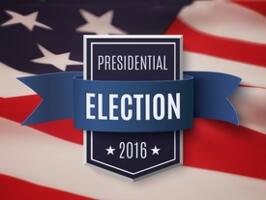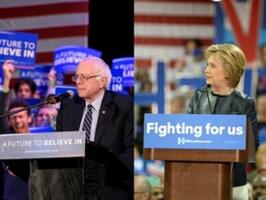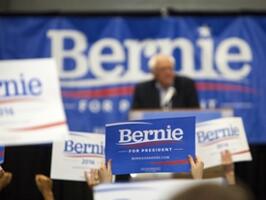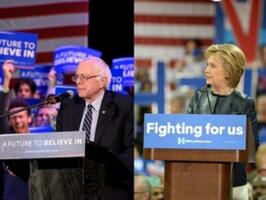Bernie's Decision to Vote for Hillary Doesn't Impress Many Democrats
Vermont Senator Bernie Sanders recently announced that he will vote for Hillary Clinton over Donald Trump but stopped short of endorsing his former Democratic primary rival. A sizable number of Democrats say they’d vote for Sanders for president if they still had that option, but most voters, regardless of political party, say his announcement will have little impact on how they vote this fall.
A new Rasmussen Reports national telephone and online survey finds that 44% of Likely Democratic Voters would vote for Sanders if he was on the ballot this November. An identical 44% say they would not. Twelve percent (12%) are not sure. (To see survey question wording, click here.)
But just 24% of Democrats are more likely to vote for Clinton because of Sanders’ announcement that he will vote for her in the general election. Twelve percent (12%) say they are less likely to vote for Clinton now, while 63% say Sanders’ announcement will have no impact on their vote.
Among all Likely Voters, 29% say they’d vote for Sanders if he was on the ballot this November. Sixty percent (60%) would not, but 11% are undecided.
Only 14% of all voters are more likely to vote for Clinton now that Sanders has decided to vote for her, while just as many (14%) say they are less likely to do so. Seventy-one percent (71%) say Sanders’ decision will not impact how they vote.
(Want a free daily e-mail update? If it's in the news, it's in our polls). Rasmussen Reports updates are also available on Twitter or Facebook.
The survey of 1,000 Likely U.S. Voters was conducted on June 26-27, 2016 by Rasmussen Reports. The margin of sampling error is +/- 3 percentage points with a 95% level of confidence. Field work for all Rasmussen Reports surveys is conducted by Pulse Opinion Research, LLC. See methodology.
In May, 85% of Democrats said it’s important for Clinton that Sanders endorse her, with 53% who said it's Very Important. Seventy-six percent (76%) expect their party will be unified after its national convention next month.
Clinton still holds a five-point lead over Trump in Rasmussen Reports’ latest weekly White House Watch survey. Both presumptive nominees, however, continue to battle high unfavorables among voters.
Thirty percent (30%) of voters not affiliated with either major political party say they’d vote for Sanders for president if he’s on the ballot in November, as would 11% of Republicans. But the vast majority of both groups say how Sanders intends to vote will have no impact on them.
Among voters under 40, a key base of support for Sanders, 45% say they’d vote for him in November if he’s on the ballot. Just 23% of middle-aged voters and 13% of senior citizens say the same. Younger voters are three times as likely as their elders to vote for Clinton now as a result of Sanders' announcement, although most still say it will have no impact on how they vote.
Black and other minority voters are more likely than whites to say they’d vote for Sanders for president in November and that his decision to vote for Clinton makes them more likely to vote for her.
Among voters who say they would vote for Sanders in November if that was still possible, 35% say they are more likely to vote for Clinton now as a result of his announcement, while only 12% are less likely to do do.
While Sanders has conceded Clinton will win the nomination, he plans to remain in the race until the Democratic national convention in late July to fight for changes to the party’s national platform. In May, 39% of Democratic voters said it’s good for the party if Sanders remains in the presidential race until their convention, while 31% said it was bad for the party.
Sanders’ unexpected success in the 2016 presidential campaign has exposed the growing rift between the Democratic party establishment and the party’s more progressive wing. Still, Democratic voters are more likely than voters in general to think their party should identify with Clinton rather than Sanders.
In early April, 51% of Democrats said they opposed their party’s use of superdelegates, individuals selected by the party who can support any candidate at the party's convention regardless of who wins their state's popular vote. Sanders and his supporters claim the system rigged the election for Clinton who has far more superdelegates in her corner than her challenger does.
Though there’s been voter anger towards the leaders of both major political parties in this year’s highly contentious presidential primary season, Republican voters are far more likely than Democrats to say their party bosses are out of touch with the voter base.
Additional information from this survey and a full demographic breakdown are available to Platinum Members only.
Please sign up for the Rasmussen Reports daily e-mail update (it's free) or follow us on Twitter or Facebook. Let us keep you up to date with the latest public opinion news.
The survey of 1,000 Likely U.S. Voters was conducted on June 26-27, 2016 by Rasmussen Reports. The margin of sampling error is +/- 3 percentage points with a 95% level of confidence. Field work for all Rasmussen Reports surveys is conducted by Pulse Opinion Research, LLC. See methodology.
Rasmussen Reports is a media company specializing in the collection, publication and distribution of public opinion information.
We conduct public opinion polls on a variety of topics to inform our audience on events in the news and other topics of interest. To ensure editorial control and independence, we pay for the polls ourselves and generate revenue through the sale of subscriptions, sponsorships, and advertising. Nightly polling on politics, business and lifestyle topics provides the content to update the Rasmussen Reports web site many times each day. If it's in the news, it's in our polls. Additionally, the data drives a daily update newsletter and various media outlets across the country.
Some information, including the Rasmussen Reports daily Presidential Tracking Poll and commentaries are available for free to the general public. Subscriptions are available for $4.95 a month or 34.95 a year that provide subscribers with exclusive access to more than 20 stories per week on upcoming elections, consumer confidence, and issues that affect us all. For those who are really into the numbers, Platinum Members can review demographic crosstabs and a full history of our data.
To learn more about our methodology, click here.





